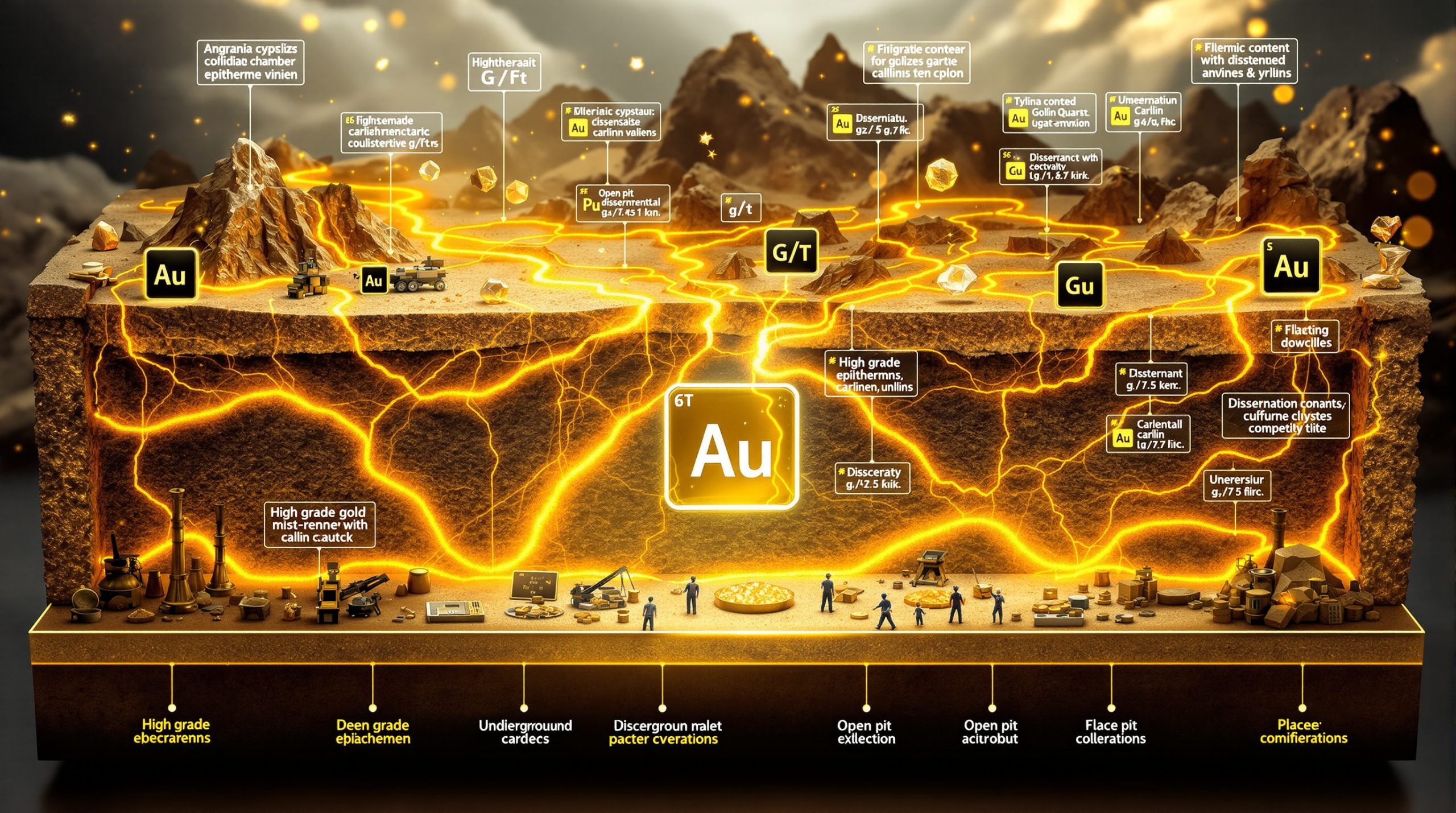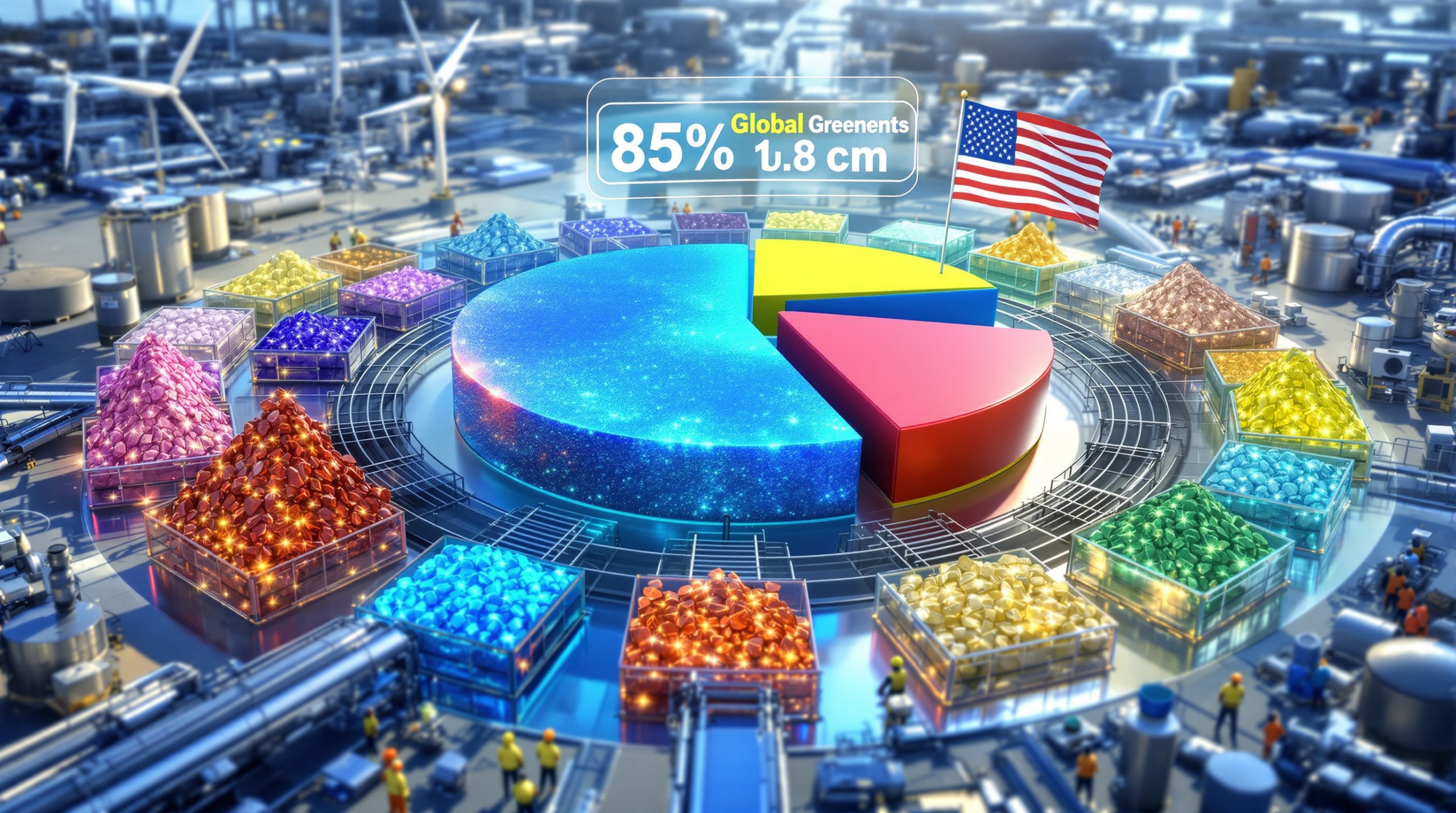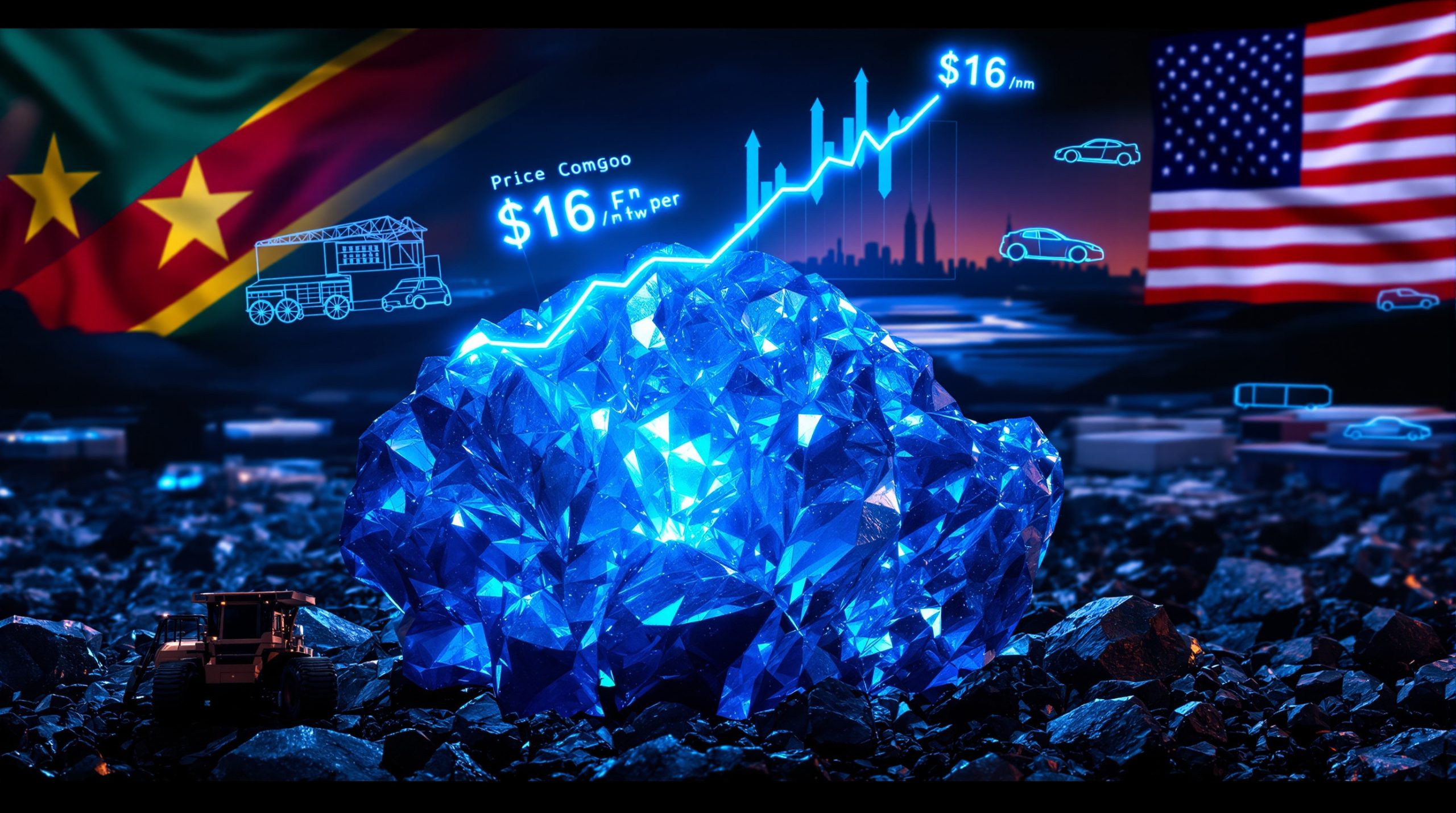IperionX's Titan Project: A Critical Milestone in US Mineral Independence
The IperionX Titan Critical Minerals Project represents a pivotal development in America's pursuit of mineral independence, with far-reaching implications for the nation's industrial and defense sectors. With a market capitalization of $692.6 million, IperionX is strategically positioned to become a cornerstone of domestic critical mineral production, particularly titanium, which has applications across aerospace, defense, medical, and consumer goods industries. The project's significance must be viewed in the context of ongoing critical mineral shortages affecting manufacturing and defense capabilities worldwide.
Understanding the Titan Critical Minerals Project
Located in Tennessee's mineral-rich Cumberland Plateau, the Titan Project sits on one of North America's largest titanium, rare earth, and zircon mineral deposits. This strategic location offers significant logistical advantages, with proximity to existing infrastructure and major industrial centers across the eastern United States.
The project's $692.6 million market capitalization reflects investor confidence in IperionX's vision to revolutionize domestic critical mineral production. What sets Titan apart is its potential to supply low-cost, sustainable titanium and other critical minerals essential to American manufacturing and defense industries.
Geological assessments indicate the Titan Project contains high-grade mineral sands with titanium dioxide concentrations averaging 3.2% across the resource area, significantly higher than many competing global deposits. These favorable grades, combined with the relatively shallow depth of the deposits (typically 3-12 meters below surface), contribute to projected lower extraction costs compared to international competitors.
What Makes the Titan DFS Significant?
The recently announced Definitive Feasibility Study (DFS) marks the final and most comprehensive phase of project evaluation, scheduled for completion by Q2 2026. What's particularly noteworthy is the substantial U.S. government support, with a $47.1 million (approximately $78.46 million AUD) award partially funding the study.
"This DFS represents a significant milestone for IperionX and American critical mineral independence," stated CEO Anastasios Arima. "The comprehensive engineering work will optimize our processing flowsheet, mine design, and infrastructure to establish the foundation for a sustainable, domestic supply of critical minerals."
The scope of the DFS extends far beyond basic economic assessment, encompassing detailed mining feasibility insights, processing flowsheet optimization, and comprehensive infrastructure design. Industry analysts have highlighted that the unusual level of government support at the DFS stage signals the project's strategic importance to national interests.
The study will incorporate advanced mineral processing technologies, including IperionX's proprietary titanium production methodologies, which could potentially reduce energy consumption by up to 45% compared to conventional processing techniques.
US Government Support and Strategic Importance
Why the US Government is Backing Titan
The substantial government funding for the Titan Project reflects an intensified national focus on reshoring manufacturing capabilities and strengthening supply chain resilience. This support aligns with broader policy initiatives aimed at reducing dependence on foreign sources of critical minerals, particularly from geopolitical competitors.
The Department of Energy has formally recognized Titan as a "nationally strategic critical minerals asset," highlighting its importance in addressing vulnerabilities in the American industrial base. This designation places the project at the center of efforts to secure domestic supply chains for advanced manufacturing, renewable energy, and defense applications.
Former Under Secretary of Defense Ellen Lord previously noted that "dependence on foreign sources for critical minerals represents one of the most significant supply chain vulnerabilities facing American industry." The Titan Project directly addresses this concern by establishing a reliable domestic source for these materials, contributing significantly to the ongoing critical minerals race between major global powers.
The Department of Energy's Assessment
A comprehensive assessment by the Department of Energy has identified critical gaps in America's mineral independence. The report concluded that the United States currently lacks robust domestic supplies of many critical minerals essential for both traditional and emerging industries.
Of particular concern are minerals needed for decarbonized energy infrastructure, including rare earths for permanent magnets in wind turbines and electric vehicles, lithium and cobalt for battery technologies, and platinum group metals for catalytic converters and fuel cells.
The assessment also highlighted less commonly discussed but equally crucial elements like gallium and germanium, which are essential for semiconductor manufacturing and advanced electronics. The Titan Project's resource profile includes several of these high-priority minerals, positioning it as a multi-faceted solution to various supply chain vulnerabilities.
Industry experts note that supply constraints for these minerals could potentially bottleneck America's energy transition and technological advancement if not addressed through projects like Titan. According to recent Department of Defense reports, domestic titanium production is considered vital for national security applications.
Commercial Potential and Market Interest
The strategic value of the Titan Project has attracted attention from various commercial sectors seeking to secure resilient supply chains. IperionX reports growing interest from potential strategic and commercial partners across aerospace, defense, automotive, and electronics industries.
These partners are primarily motivated by the prospect of securing long-term supplies of domestically sourced critical minerals, reducing vulnerability to international market fluctuations and geopolitical tensions that have historically disrupted global supply chains.
Market analysts have highlighted that domestic titanium production from Titan could potentially save American manufacturers millions in import costs and supply chain risk mitigation. The titanium market alone is projected to grow at a CAGR of 3.7% through 2030, creating expanding opportunities for domestic suppliers like IperionX.
Industry insiders note that several major manufacturers have already initiated discussions regarding offtake agreements, though specific details remain confidential due to commercial sensitivities.
How Does Titan Fit into IperionX's Growth Strategy?
The Titan Project represents the upstream component of IperionX's vertically integrated titanium production strategy. By controlling mineral feedstocks, the company aims to create a secure, end-to-end domestic supply chain for titanium and other critical minerals.
This vertical integration creates significant competitive advantages, including reduced exposure to international market volatility, lower transportation costs, and the ability to optimize feedstock characteristics for downstream processing facilities.
From a national security perspective, this integrated approach aligns perfectly with Department of Defense priorities to establish secure supply chains for materials used in advanced weapons systems, aircraft, naval vessels, and space applications.
The company's leadership has articulated a vision of becoming "America's titanium champion," with the Titan Project serving as the foundation for this ambitious growth strategy. CEO Arima has emphasized that "establishing domestic critical mineral production is only the first step in building a resilient American titanium industry."
Market observers note that this integrated approach differentiates IperionX from competitors who focus solely on either mineral extraction or metal production, potentially creating superior long-term value. The company's approach mirrors successful models seen in other projects like Nolans Rare Earths that have strategically positioned themselves in global supply chains.
What's Next for the Titan Project?
With DFS completion expected by Q2 2026, IperionX has outlined an ambitious development timeline. The comprehensive nature of the government-supported feasibility study suggests potential for expedited permitting and regulatory approvals once the DFS is complete.
Industry analysts anticipate the possibility of additional government support beyond the current $47.1 million award, particularly through Defense Production Act Title III funding or Department of Energy loan guarantees designed to accelerate critical mineral projects.
Commercial partnership opportunities continue to expand as more industries recognize the strategic value of secure domestic titanium and critical mineral supplies. The company has indicated that discussions with potential offtake partners are progressing concurrently with the technical development work.
IperionX's titanium production expansion plans are being carefully synchronized with the Titan Project development timeline, creating a coordinated approach to building America's first fully integrated titanium supply chain in decades.
Environmental considerations also factor prominently in future planning, with the company emphasizing its commitment to sustainable mining practices and progressive site rehabilitation. The Tennessee location provides advantages in this regard, with abundant water resources and existing environmental management infrastructure.
FAQ About IperionX and the Titan Project
What critical minerals will the Titan Project produce?
The Titan Project will primarily focus on titanium minerals, including rutile, leucoxene, and ilmenite, which serve as essential feedstocks for titanium metal production. However, the deposit also contains significant quantities of zircon, rare earth elements, and other minerals classified as critical by the U.S. government.
Geological assessments indicate potential for recoverable quantities of rare earth elements, particularly those used in permanent magnets (neodymium, praseodymium, dysprosium), which are essential for electric vehicle motors and wind turbines. The project's mineral processing facilities are being designed to maximize recovery of these valuable secondary products.
How is the US government supporting the Titan Project?
The U.S. government is providing substantial support through a $47.1 million award that partially funds the Definitive Feasibility Study. This funding comes from initiatives specifically designed to strengthen domestic critical mineral supply chains and reduce dependence on foreign sources.
Beyond direct financial support, the project has received formal recognition as a strategically important asset for U.S. mineral independence. This designation can potentially streamline permitting processes and open additional funding opportunities as the project advances toward production.
The Department of Defense and Department of Energy have both expressed interest in the project's potential to address specific supply chain vulnerabilities identified in recent strategic assessments. This multi-agency interest underscores the project's importance to various aspects of national security and industrial competitiveness, similar to how Australia has provided federal grants in critical minerals to bolster its own industry.
When will the Definitive Feasibility Study be completed?
The Definitive Feasibility Study is expected to be completed by Q2 2026. This comprehensive study will include detailed mine engineering, processing flowsheet optimization, and infrastructure design necessary to advance the project toward construction and operation.
The extended timeline reflects the thorough nature of the study, which will incorporate extensive metallurgical testing, pilot plant operations, and environmental baseline studies to ensure optimal project design and sustainability. The government funding allows for a more comprehensive scope than typical feasibility studies, potentially accelerating subsequent development phases.
Industry experts note that while this timeline may seem extended, it represents an accelerated schedule compared to similar projects developed without strategic government support, which often face regulatory and funding delays that the Titan Project may avoid through its national priority status.
Are You Positioned for the Next Major Mineral Discovery?
Stay ahead of the market with instant notifications on significant ASX mineral discoveries through Discovery Alert's proprietary Discovery IQ model, turning complex mineral data into actionable insights. Understand why historic discoveries can generate substantial returns by visiting Discovery Alert's dedicated discoveries page and begin your 30-day free trial today to position yourself ahead of the market.




